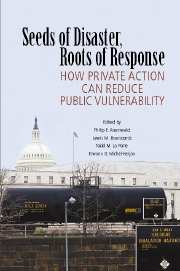Book contents
- Frontmatter
- Contents
- List of Contributors
- Foreword, by General Robert T. Marsh
- Preface
- Acknowledgments
- I SEEDS OF DISASTER
- II A CRITICAL CHALLENGE
- 2 A Nation Forewarned: Vulnerability of Critical Infrastructure in the Twenty-First Century
- 3 The Brittle Superpower
- 4 Critical Infrastructure Protection in the United States Since 1993
- 5 Evolution of Vulnerability Assessment Methods
- III MANAGING ORGANIZATIONS
- IV SECURING NETWORKS
- V CREATING MARKETS
- VI BUILDING TRUST
- VII ROOTS OF RESPONSE
- References
- Contributors
- Author Index
- Subject Index
3 - The Brittle Superpower
Published online by Cambridge University Press: 30 July 2009
- Frontmatter
- Contents
- List of Contributors
- Foreword, by General Robert T. Marsh
- Preface
- Acknowledgments
- I SEEDS OF DISASTER
- II A CRITICAL CHALLENGE
- 2 A Nation Forewarned: Vulnerability of Critical Infrastructure in the Twenty-First Century
- 3 The Brittle Superpower
- 4 Critical Infrastructure Protection in the United States Since 1993
- 5 Evolution of Vulnerability Assessment Methods
- III MANAGING ORGANIZATIONS
- IV SECURING NETWORKS
- V CREATING MARKETS
- VI BUILDING TRUST
- VII ROOTS OF RESPONSE
- References
- Contributors
- Author Index
- Subject Index
Summary
The United States has been living on borrowed time – and squandering it. In the four years since the September 11, 2001, attacks on the World Trade Center towers and the Pentagon, the Bush administration has chosen to emphasize the use of military operations overseas over an effort to reduce America's vulnerability to catastrophic terrorist attacks at home. While the administration has acknowledged in principle the need to improve critical infrastructure protection, in practice it has placed the burden for doing so primarily on the private sector that owns and operates much of that infrastructure. But this delegation of responsibility fails to acknowledge the practical limits of the marketplace to agree upon common protocols and to make investments to bolster security. As a result, the transportation, energy, information, financial, chemical, food, and logistical networks that underpin U.S. economic power and the American way of life remain virtually unprotected. The tragic loss of life in the aftermath of Hurricane Katrina in 2005 exposed Washington's shocking lack of preparedness to respond to large-scale disasters on American soil. The United States may be the world's sole superpower, but it is showing ominous signs of being a brittle one. If the federal government does not provide meaningful incentives to make U.S. infrastructure more resilient and create workable frameworks for ongoing public and private partnerships to advance security, future terrorist attacks and natural disasters with profound economic and societal disruption are inevitable.
- Type
- Chapter
- Information
- Seeds of Disaster, Roots of ResponseHow Private Action Can Reduce Public Vulnerability, pp. 26 - 36Publisher: Cambridge University PressPrint publication year: 2006
- 1
- Cited by

